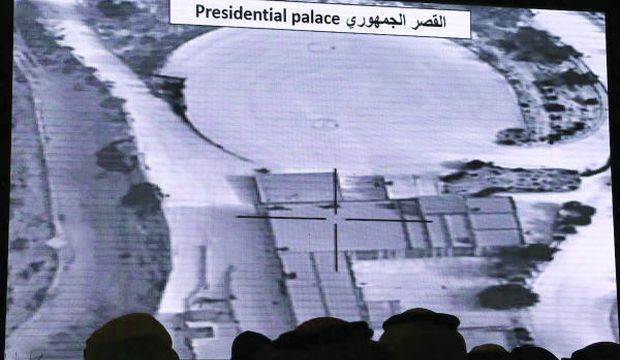
Reporters gathered at the Riyadh Airbase in Saudi Arabia watch footage presented by the Kingdom’s Defense Ministry showing warplanes from the Saudi-led coalition against the Houthis in Yemen targeting the Presidential Palace in the Yemeni southern province of Taiz, on April 19, 2015. (Asharq Al-Awsat/Ali Al-Oraifi)
Sana’a, Aden and Riyadh, Asharq Al-Awsat—The Iran-backed Shi’ite Houthi movement has rejected the recent UN resolution targeting the group, which is currently in de facto control of the country after launching a coup in February.
In its first official reaction to the Security Council’s Resolution 2216, which last Tuesday imposed an embargo on the sale of arms to the Houthis and their ally, ousted former president Ali Abdullah Saleh, the movement said in a statement on Saturday that the Council’s decision “must be opposed by all means.”
It also condemned the UN’s support for what it called an “act of aggression” against the country—in reference to ongoing Saudi-led airstrikes targeting the Houthis in Yemen.
In addition to the arms embargo, the resolution also slapped global asset freezes and travel bans on Saleh and his son, Ahmed, as well as a number of top Houthi figures, including one of the movement’s leaders, Abdul Malik Al-Houthi.
The movement said it rejected the placing of any Houthi figure “or Yemeni citizen on sanctions lists under Chapter VII [of the UN Charter]”—which allows the Security Council to take action, whether military or non-military, against any group or individual who threatens the peace and security of a member state.
“The decision [Resolution 2216] is unjust, supports the oppressor against the oppressed, and is biased towards this coalition which targets the people of Yemen,” the statement said, referring to the Saudi-led coalition, known as Operation Decisive Storm.
The UN should instead have imposed sanctions against “the murderers and vampires who are killing and besieging an entire population, as well as violating their sovereignty and dignity,” the statement continued, once again referring to the Saudi-led coalition.
Operation Decisive Storm, launched by Saudi Arabia and its allies on March 5, came as a result of calls for military intervention in Yemen by the country’s internationally recognized President Abd Rabbuh Mansur Hadi, whose legitimacy was reiterated in last week’s resolution.
In recent days the coalition has intensified airstrikes on the port city of Aden, where Houthi militias have been seeking to obtain a southern foothold in the country in similar fashion to their takeover of the capital Sana’a last September, when they occupied government institutions and buildings as well as various military installments.
Their advance on Aden, however, has been blocked by local armed tribal and volunteer groups loyal to Hadi, who have been aided by the ongoing airstrikes.
Local sources told Asharq Al-Awsat on Saturday that the strikes had been especially intensified during the last 48 hours, and have been targeting the movement of weapons and military supplies by the Shi’ite group into the city as well as areas where they had moved such supplies in previous weeks.
The sources said the Houthis and aides of former president Saleh in the military and security establishments—who have eased the Houthi advance across the country—had hidden these supplies in civilian locations, including some of the city’s schools.
In his daily briefing on the progress of the strikes, Saudi Defense Ministry spokesman Brig. Gen. Ahmed Asiri told reporters gathered at the Riyadh Airbase on Saturday that the coalition was continuing to back local forces on the ground which supported the legitimacy of President Hadi.
They have now been joined by the Yemeni Army’s 35th Brigade, who were formerly loyal to Saleh and the Houthis but have now switched sides to fight alongside local tribes and volunteer groups in Aden against the Shi’ite movement.
Asiri said these forces have now “achieved major advances on the ground in Aden and are beginning to locate weapons storage areas” belonging to the Houthis, who have placed their supplies in residential areas, including inside civilians’ homes.
In addition to strikes on Aden, coalition forces have also been targeting the Presidential Palace in the southern governorate of Taiz, which lies 111 miles (179 kilometers) northwest of Aden. Asiri said the Houthis have been using the palace as a base from which to launch attacks in the province and to store weapons and military equipment.
Coalition airstrikes also continued targeting the Houthis’ traditional northern stronghold of Saada, where they are supporting military units from the Yemeni Army on the ground against the Houthi militias.
Asiri also made mention of a possible “terrorist attack” which the Houthis are planning to launch against Saudi border guards stationed on the boundary between the Kingdom and Yemen. Saudi border guards have been targeted by Houthi militias since the conflict began, leading to several deaths and injuries.
Exchanges of fire had taken place in recent days between the border guards and Houthi militias, leading to the death of one member of the Saudi military, Asiri revealed.
“The Houthi militias are attempting to draw coalition forces into a ground operation,” he said, adding that members of the alliance would not be intimidated by any Houthi aggression into altering their planned operations.
Mohamed Ali Mohsen and Nasser Al-Haqbani contributed additional reporting from Aden and Riyadh.
